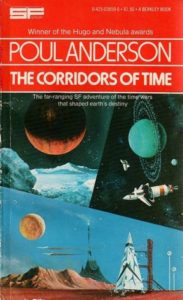 In this classic sci-fi from the golden age of the 1960’s, two warring groups, the Rangers and the Wardens, fight each other in various places and times over the centuries.
In this classic sci-fi from the golden age of the 1960’s, two warring groups, the Rangers and the Wardens, fight each other in various places and times over the centuries.
Time tunnels were built in some distant future that allowed these tribes to travel into the past where they try to kill each other to secure future wealth and power. We learn, for example, that the Rangers were responsible for Cromwell’s rise in 1650’s England, but the Wardens led the Restoration afterward.
Much of the battling in the past centers around Denmark (Pohl’s homeland), the North Sea, and Southern England, and in Neolithic times, the Bronze Age, and the Middle ages.
A homeboy from Pennsylvania in modern times is attracted by a mysterious woman and follows her into a time corridor back to a Neolithic period where she, a Warden, has to lie low for a while, as she has just narrowly escaped a Ranger attack in the Middle Ages. Or some such. He becomes sort of her bodyguard.
Battles are waged with flint knives and axes in the stone age, later with swords, except that the head Ranger and the head Warden have ray guns, so there’s that to watch out for. The hero, our plain ol’ farm boy (who speaks with dropped g’s), comes to doubt the “goodness” of his Warden leader and wonders if he should switch sides to the Rangers, although for the reader, the two sides are indiscriminable and it is never clear what is at stake anyway.
Our hero eventually resettles his fair maiden from Neolithic times in the bronze age as his wife. She adapts well, as nothing much seems to have changed for her, whereas he becomes contemplative. He never returns to modern times.
The writing is remarkably good. Well-wrought descriptions are vivid and I found it interesting to note how English vocabulary and usage have changed in the past half-century. For example, people “smote” each other in the 1960’s, but not today.
The tale has no real scientific component. As an idea piece, it’s stimulating. What if interest groups did go back in time to try to influence present-day events? Assassinate Hitler? Reinforce the armies of Robert E. Lee? Provide counseling to Virgina Woolf?
In this novel, nobody dares travel to the future, ahead of their “natural” time, because, it is said, once you know the future, you become paralyzed by destiny and are afraid to act. Interesting stuff, and I can see why Anderson was one of the great founders of the genre.
This particular piece, while nominally sci-fi, has no science, so it’s really fantasy, not sci-fi, even though it won both the Hugo and the Nebula. It’s not psi-fi either, since it’s all swordfighting adventure, providing no insight into human psychology. But it’s Fun-fi.
Anderson, Poul (1965/1978). The Corridors of Time. New York: Berkeley/Medallion, 186 pp.